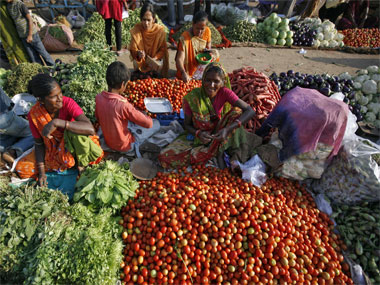Even as the political opposition to the government opening up the retail sector to more foreign direct investment continues, wholesale produce traders in Vashi’s Agriculture Produce Market Committee (APMC) have jumped on to the anti-FDI bandwagon.
Traders of the wholesale market - which supplies most retailers in and around Mumbai agricultural produce - participated in a protest march against the FDI policy today, saying that their livelihood was being sacrificed for corporate gains.
Around 30 traders and members of APMC took out a march from its Turbhe compound to Vashi, wearing black caps and brandishing placards with anti- FDI slogans, some with messages like ‘FDI go back!’ They were protesting the cabinet’s policy decision to allow 100 percent FDI in single brand retail and 51 percent in multi-brand retail.
[caption id=“attachment_142572” align=“alignleft” width=“380” caption=“Traders at Navi Mumbai’s wholesale APMC took out a protest march against the government’s policy to allow FDI in retail.”]
 [/caption]
[/caption]
Raising slogans against the Central government, the traders said they have called for a nationwide bandh on 1 December to bring to the fore their grievance against the policy.
“We have five crore people already working in our system - from farmers to suppliers to exporters to processors - and we want that those people be used to their potential. If foreign players come into the Indian market, all those people will become unemployed,” Sanjay Narayan Pansare, director of the APMC, said, adding “The foreign retailers will take over our market and have a monopoly.”
Impact Shorts
More ShortsPansare blames the present inflation in India on earlier policies of the government to open India up to global markets and said that any more policies favouring free trade would make the economy more vulnerable to fluctuations across the world.
“Inflation today is because of opening our markets to foreigners and we are going to repeat the same mistake again,” Pansare said, adding, “This whole move to allow more foreign investment is for political and corporate gains. Why should we suffer?”
Exporter Mohan Dongre was more forthright in his reason for opposing the policy.
“If they (the foreign retailers) directly purchase produce, our business will suffer,” Donge said.
Donge, who also has retail wholesale outlets in Crawford market, says the onslaught of local retailers and hypermarkets, has already adversely affected his business. “My retail wholesale business has dropped by 10-12 percent since malls and markets have started selling produce and if there’s FDI now, what will happen to my business?”
Donge has his own cold storages, riping chambers and packaging houses and he says that foreign players will shut his business as nobody will want to then avail of the facilities he offers.
The traders will observe a day’s strike on Thursday and no business will be conducted in the market,as shops will be shut to protest the policy.
The APMCs were established by the state government for regulating the marketing of different kinds of agriculture and pisciculture produce and they serve as the go between for farmers who want to sell their produce in the market and retailers who want to buy them. The Vashi market alone has an annual turnover of Rs 8,000 crore.
)